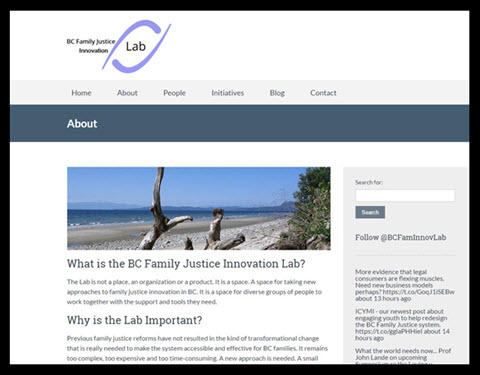In the fall of 2013 a small group gathered in a Gastown meeting room. They were all lawyers who had worked for years trying to make BC’s justice system work better for families. They were all disturbed by the fact that a series of excellent reports with recommendations for improvement had not resulted in real positive change in the lives of families and children going through the justice system. But this meeting wasn’t just another gripe session.
With a lot of openness, innovative thinking and hard work, that meeting has led to the development of the BC Family Justice Innovation Lab – an exciting, action-oriented initiative using new methods to foster real change. In this eNews Kari Boyle, Lab consultant and coordinator, describes its formation and work.
The group (its membership has broadened and changed over the years) launched the BC Family Justice Innovation Lab in 2014 to develop and practice new approaches to improving the BC family justice system. It is a unique innovation platform for nurturing initiatives designed to improve resilience and well-being of families and their children who are experiencing transition, including separation and divorce. It uses a systemic human-centred design approach putting families and children at the centre.
The “system” in this context is not just the court system; it is larger and encompasses the family’s entire journey through separation and divorce. This is important because, for families, separation and divorce are not legal problems with some social aspects; they are social problems with some legal aspects.
Why are new approaches needed?
The short answer is that most of the previous family justice reform efforts have not resulted in the kind of transformational change that is really needed to make the system accessible and effective for BC families. The Lab team looked outside of the “justice system” and learned that “lab” approaches are being used in many other sectors to effect meaningful social change. The approach is different because it is:
- family-centred
- systemic
- participatory
- experimental

The Lab is focused on action rather than reports. Its members believe there are enough reports. Its aim is to experiment and to take a “learn as you go” approach, while still ensuring robust evaluation data is available and used.
What is the Lab working on?
The Lab has attracted funding support from the Vancouver Foundation, Innoweave (part of the J.W. McConnell Family Foundation), and the Legal Services Society/Law Foundation Research Fund.
The Lab (version 1.0) started by “adopting” three existing initiatives, most of which centred on non-court options for families (primarily mediation and collaborative law). It added the BC Family Unbundled Legal Services initiative – a roster and toolkit - under its umbrella in 2016. The Lab supports these initiatives primarily by working with the project teams to create and use a developmental evaluation approach (“learn as you go”) and by convening team members and stakeholders to gather and share important learning (which will help to prevent “siloing” and reinvention of the wheel).
During 2016, the Lab also launched an exciting new initiative which aims to support the well-being of youth who have experienced their parents’ separation or divorce. For the Youth Voices Initiative, the Lab has committed to using and learning from a “systemic human-centred design” approach, drawing on well-established “design thinking” knowledge and experience both locally and from other sectors and jurisdictions.
Research shows that the divorce process can be very damaging for children as their well-being is closely linked to the level of conflict between their parents and other factors. Working with Open Road Communications, local experts in service design, the Lab has started from the ground up with a workshop to hear the stories of youth, in their own words. It will continue with a series of design workshops to develop prototypes to change the system to preserve and improve youth well-being.
Traditional reform efforts typically start with the professional stakeholders. However, this process started with a narrative workshop on January 22, 2017 to better understand the emotional, informational, and legal needs of youth during separation and divorce. Developmental evaluation will be used to capture key lessons and incorporate them along the way.
The Lab’s Blog provides interesting insights into its approach and its progress into version 2.0 and beyond. You can follow the Lab on Twitter (@bcfaminnovlab) and on Facebook. And it welcomes your comments and questions sent to
info@bcfamilyinnovationlab.ca.

